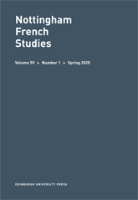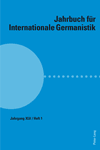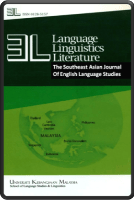
Naslede
Scope & Guideline
Bridging local insights with global scholarship.
Introduction
Aims and Scopes
- Interdisciplinary Literary Analysis:
The journal publishes works that explore literary texts from various angles, including historical, cultural, and philosophical perspectives. This includes studies on modernist, postmodernist, and contemporary literature. - Linguistic Research and Language Education:
A significant focus is on linguistic analysis and the teaching of languages, particularly Serbian and foreign languages. This encompasses studies on syntax, semantics, and language acquisition. - Cultural Studies and Identity:
Research that investigates the relationship between literature and cultural identity is a core area. This includes explorations of how literature reflects and shapes cultural narratives and identities. - Translation Studies:
The journal addresses issues in translation theory and practice, particularly related to Serbian literature and its translations into and from other languages. - Critical Theory and Methodology:
Papers often engage with various critical theories, including feminist, postcolonial, and psychoanalytic frameworks, providing a methodological diversity that enriches the discourse. - Historical Contextualization:
Research that situates literary works within their historical contexts is emphasized, particularly concerning Serbian and Balkan literature.
Trending and Emerging
- Digital Humanities and Literature:
There is a growing trend towards integrating digital tools and methodologies in literary studies, examining how digital media influences literature and reading practices. - Interdisciplinary Approaches to Trauma and Memory:
Research focusing on trauma literature and the representation of collective memory has gained momentum, reflecting an increased awareness of historical injustices and their literary portrayals. - Cultural Globalization and Identity:
Studies exploring the impact of globalization on cultural identity, particularly in the context of Serbian literature, are increasingly prevalent, indicating a shift towards examining cross-cultural influences. - Environmental Literature and Eco-Criticism:
Emerging themes related to the Anthropocene and environmental issues in literature are becoming more prominent, showcasing a growing concern for ecological narratives. - Gender Studies and Feminist Literary Criticism:
There is a notable increase in research that engages with gender studies, particularly feminist perspectives in literature, reflecting broader societal movements and conversations around gender equality.
Declining or Waning
- Traditional Literary Criticism:
There appears to be a decrease in papers solely focused on traditional literary criticism, as newer methodologies and interdisciplinary approaches gain traction. - Local Dialect Studies:
Research specifically centered on local dialects and their preservation has diminished, possibly overshadowed by more global linguistic trends and the emphasis on standard language education. - Historical Linguistics:
The papers focusing on the historical evolution of the Serbian language have become less frequent, indicating a potential waning interest in diachronic studies in favor of synchronic analysis. - Folklore Studies:
The emphasis on folklore as a separate area of study has seen a decline, with fewer papers exploring traditional narratives compared to previous years. - Nostalgia in Literature:
Themes of nostalgia, particularly in relation to historical events and literature, are appearing less frequently, suggesting a shift towards contemporary issues and narratives.
Similar Journals

Listy Filologicke
Cultivating a Nexus for Innovative Academic Exploration.Listy Filologicke is a distinguished academic journal published by the Institute of Classical Studies at the Academy of Sciences of the Czech Republic, focusing on the interdisciplinary fields of History, Linguistics and Language, and Literature and Literary Theory. With an ISSN of 0024-4457 and an E-ISSN of 2570-9410, this journal has been a pivotal platform for scholarly discourse since its convergence years began in 2003. Notably, it holds a Q3 classification in History and Linguistics and Language, and a Q2 in Literature and Literary Theory as of 2023. Its rankings within Scopus illustrate its relevance and impact in academia, with noteworthy positions in the Arts and Humanities and Social Sciences categories. Researchers, professionals, and students will find Listy Filologicke an invaluable resource for exploring cutting-edge research, critical analyses, and discourse that contribute significantly to their respective fields. Based in the heart of the Czech Republic, it continues to promote scholarly excellence and foster international collaboration.

NOTTINGHAM FRENCH STUDIES
Unveiling the Rich Tapestry of French History and LiteratureNOTTINGHAM FRENCH STUDIES is a distinguished academic journal published by Edinburgh University Press, focusing on the diverse realms of French language, literature, culture, and history. With its ISSN 0029-4586 and E-ISSN 2047-7236, the journal serves as a vital platform for scholarly discourse, featuring interdisciplinary research that bridges gaps between Cultural Studies, Linguistics, and Literary Theory. Notable for its robust performance, it holds a Q3 ranking in Cultural Studies and Linguistics and a Q2 ranking in Literature and Literary Theory as of 2023, placing it among the key publications within its field. Throughout its publication span from 1996 to 2024, NOTTINGHAM FRENCH STUDIES has consistently catered to the academic community with insightful articles, enriching the understanding of French cultural contexts. While it is not an Open Access journal, its contributions are pivotal in advancing scholarly dialogue and fostering critical perspectives, making it an essential resource for researchers, professionals, and students engaged in French studies and its interdisciplinary connections.

NEOPHILOLOGUS
Exploring the Depths of Language and Literary TheoryNEOPHILOLOGUS, published by Springer, stands as a pivotal journal in the fields of Linguistics and Language as well as Literature and Literary Theory. With an illustrious history dating back to 1916 and continuing through various phases until 2024, this journal has entrenched itself as a crucial platform for scholarly discussion and research dissemination. NEOPHILOLOGUS is recognized for its high academic standards, as evidenced by its impressive category quartiles, ranking in the Q2 tier for Linguistics and Language and Q1 for Literature and Literary Theory as of 2023. Notably, it ranks in the 81st percentile for Arts and Humanities in the Scopus database, underscoring its significant contribution to the humanities discourse. While the journal does not currently offer open access options, it remains a valuable resource for researchers, professionals, and students seeking in-depth analyses and insights within its specialized domains. Based in Dordrecht, Netherlands, NEOPHILOLOGUS invites contributions that advance our understanding of linguistic and literary phenomena, ensuring its relevance and impact in these dynamic fields.

JAHRBUCH FUR INTERNATIONALE GERMANISTIK
Exploring the Depths of German Literature and LinguisticsJAHRBUCH FUR INTERNATIONALE GERMANISTIK is a prominent academic journal published by VERLAG PETER LANG AG, dedicated to advancing research in the fields of German studies, literature, and linguistics. With its ISSN 0449-5233 and E-ISSN 2235-1280, this journal provides a platform for scholarly discourse, critical analysis, and innovative studies related to German language and literary theory. Although its coverage in Scopus was discontinued in 2014, the journal continues to be influential within the academic community, evidenced by its rankings in the Arts and Humanities and Social Sciences categories. Specifically, it holds a rank of #397 in Literature and Literary Theory and #477 in Language and Linguistics, reflecting a solid presence among peers. Researchers and students alike can benefit from its insightful articles that delve into various dimensions of Germanistik, thereby fostering a greater understanding of language and cultural contexts. For those interested in contributing to this field of study, JAHRBUCH FUR INTERNATIONALE GERMANISTIK serves as an essential resource for high-quality scholarly content.

Anuari de Filologia-Llengues i Literaturas Modernas
Advancing scholarship in modern languages and literary studies.Anuari de Filologia-Llengues i Literaturas Modernas is a distinguished academic journal published by the Universitat de Barcelona, specifically the Facultad de Filologia. This journal focuses on the fields of modern languages and literatures, aiming to foster scholarly dialogue and disseminate groundbreaking research in linguistics and contemporary literary studies. With its open access model established in 2011, it ensures that research findings are freely available to a wide audience, enhancing visibility and impact in the academic community. Although the journal's H-index and Scopus ranking are currently not available, its ongoing commitment to high-quality peer-reviewed scholarship plays a crucial role in advancing knowledge in the humanities. Positioned as a valuable resource for researchers, professionals, and students alike, the journal invites contributions that push the boundaries of understanding within modern philology and cultural studies.

Romanic Review
Cultivating Academic Conversations Across Languages and LiteraturesThe Romanic Review, published by Duke University Press, stands as a significant scholarly platform in the field of Romance languages and literature. With its ISSN 0035-8118 and E-ISSN 2688-5220, this journal has been serving the academic community since its inception and will continue its contribution until 2024. Situated in the United States, it has carved out a vital niche in the Arts and Humanities, currently falling within the Q3 quartile as per the 2023 rankings. Although it operates under a traditional subscription model, its focus on disseminating critical and innovative research makes it an indispensable resource for scholars and students alike. The Romanic Review is dedicated to fostering academic discussions that bridge interdisciplinary gaps, making it a cornerstone reference for anyone engaged in the study of Romance cultures, linguistics, and literary studies.

MODERNA SPRAK
Connecting Researchers and Educators in Language ScienceMODERNA SPRAK, published by LMS-Modern Language Teachers Association, is a vital journal in the field of linguistics and language studies that has been contributing to academic discourse since its inception in 2002. With an ISSN of 2000-3560, this Swedish journal provides a platform for researchers, educators, and language enthusiasts to explore contemporary issues and advancements in linguistics. Despite its Q4 category ranking in the 2023 category quartiles, its focus on diverse linguistic perspectives and innovative methodologies ensures its continued relevance and importance. As of 2023, it holds notable ranks within Scopus, placing it within the lower percentile of its categories—yet this offers a unique opportunity for emerging scholars to contribute to its growth and visibility. While MODERNA SPRAK is not an open access journal, it serves as a rich resource for academic networking and knowledge sharing in the evolving landscape of language education and research. The journal's commitment to fostering scholarship within an inclusive framework makes it an essential read for those engaged in the language sciences across various educational contexts.

Al-Arabiyya-Journal of the American Association of Teachers of Arabic
Empowering Arabic Education through Innovative ResearchAl-Arabiyya: Journal of the American Association of Teachers of Arabic, published by Georgetown University Press, serves as a significant platform for research and scholarship in the fields of Arabic language education, linguistics, and literature. With its ISSN 0889-8731 and E-ISSN 2375-4036, this journal presents a robust blend of original articles, reflections, and pedagogical research aimed at both seasoned educators and emerging scholars. While the journal is not an open-access publication, it maintains a commendable impact in its categories, achieving Q4 in Education and Q2 in Literature and Literary Theory as per the latest rankings. Notably, it has been recognized within Scopus for its contributions to the arts and humanities, with rankings that reflect a vibrant academic discourse surrounding the Arabic language. Al-Arabiyya aims to promote and enhance the teaching and learning of Arabic while fostering an understanding of its literary and cultural richness, making it an invaluable resource for anyone interested in Arabic studies.

POETICA-ZEITSCHRIFT FUR SPRACH-UND LITERATURWISSENSCHAFT
Advancing Scholarly Research in Language and LiteraturePOETICA-ZEITSCHRIFT FUR SPRACH-UND LITERATURWISSENSCHAFT is a pivotal journal published by Brill, focusing on the fields of linguistics and literary studies. Founded in Germany, this esteemed publication showcases rigorous scholarly research, fostering a deeper understanding of language and literature. Although the journal does not currently operate as an open-access platform, it remains an essential resource for academics in these areas, featuring innovative studies that span from 2002, through selected years, to 2024. With a Q4 category in Linguistics and Language and a Q3 in Literature and Literary Theory as of 2023, POETICA ranks among the significant contributors to the arts and humanities discourse. It provides a vital forum for researchers and students to engage with contemporary debates and methodologies, ensuring its relevance and importance in the academic community.

3L-Language Linguistics Literature-The Southeast Asian Journal of English Language Studies
Innovating Research in Language Studies and Literary Theory3L-Language Linguistics Literature - The Southeast Asian Journal of English Language Studies is a prestigious academic journal published by Penerbit Universiti Kebangsaan Malaysia, showcasing the dynamic field of linguistics, language studies, and literature. With an open access policy since 2006, this journal aims to disseminate high-quality research and critical analyses, catering to an international audience of researchers, academics, and practitioners. The journal has achieved impressive rankings, positioning it in the Q2 category for Linguistics and Language, and Q1 for Literature and Literary Theory in 2023, reflecting its significant impact in these fields as evidenced by a remarkable Scopus ranking of #27/1106 in Literature and Literary Theory, placing it in the 97th percentile. This makes 3L an essential resource for those seeking to engage with contemporary issues and innovations within the Southeast Asian context and beyond. With a commitment to advancing knowledge in language and literature, 3L fosters a vibrant scholarly community dedicated to excellence in research.